Letting Go: Delegating Veterinary Tasks for Team Efficiency

The responsibilities that a veterinary practice leader shoulders can be overwhelming. When a medical director, practice manager, or practice owner believes only they can accomplish the tasks on their to-do lists, practice efficiency and personal well-being suffer. Letting go and delegating veterinary tasks can reduce your workload and create opportunities so your team members are fulfilled and can progress. Here are some ways managers and practice leaders can use delegation to successfully pass the torch.
Understanding team member strengths
Understanding each team member's individual skills and strengths can help you determine which tasks they can perform successfully. You likely have team members who excel in organization, attention to detail, communication, training, or math and accounting. And, you most likely have team members looking to grow and earn more money and want more responsibilities. If you can’t see a team member’s strengths clearly based on their performance, sit down with them and ask about their long-term goals and interests. Once you understand each team member's strengths, delegate veterinary tasks that align with those skills.
Evaluating your current responsibilities
Start delegating veterinary tasks by taking an inventory of your workload, including your daily, weekly, and monthly tasks. Categorize these tasks into groups based on their difficulty, time commitment, and whether you enjoy them. Keep the tasks you love under your purview, but offload the ones you dread or that take excessive amounts of your time.
Delegating energy-draining activities can help you refocus on the most important items that require your expertise and skill and align with your strengths and preferences. You will benefit from delegating veterinary tasks you are good at but don't enjoy, because you can then focus more on your core responsibilities. Also, your team members are empowered to develop new skills.
Empowering and training team members
Many leaders opt not to delegate tasks because they have the “If you want it done right, do it yourself” mindset, which will become a self-fulfilling prophecy if you don’t train and guide team members appropriately and provide them with the necessary resources. Assigning a task without proper guidance, check-ins, and follow-ups can lead to mistakes, missed marks, and frustration from every perspective. Investing in thorough initial training can ultimately free up your schedule, improve practice efficiency, and elevate individual team members to new roles.
Delegating veterinary tasks not only gives team members a more significant role in practice success, but also empowers them to make decisions and take actions that would otherwise fall on the hospital leader. Offloading responsibilities to individual team members means they can become experts in certain areas or protocols and deal with problems in those areas. When you are no longer bombarded with endless questions and concerns, you can focus on running the business and managing your team.
Giving up control and avoiding micromanaging
Follow-up and guidance are crucial to successfully delegating veterinary tasks, but managers should ensure that guidance doesn’t border on micromanaging. You must work with delegates, ensure they understand the process, and then step back and let them do their jobs. If you’ve established a positive, open-door culture, your team members should feel comfortable asking for help.
Setting clear expectations and scheduling periodic check-ins or audits are likely enough to determine if team members have performed tasks correctly. If you find yourself hovering or constantly correcting errors, consider whether your team’s problems are because of training, trust, culture, or hiring. Do you have the right people you can trust, or is the problem that you’ve never given them a chance?
Delegating veterinary tasks is a powerful way to achieve maximum efficiency. Understanding and trusting your team's strengths, evaluating your own workload, and offering ongoing training and guidance can empower your team to take on new and varied roles that increase job satisfaction while helping the practice thrive. Delegation not only lightens your workload but also helps create a cohesive team where everyone contributes to practice success.




